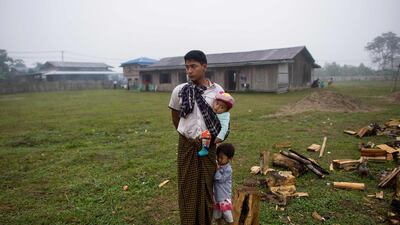Criticism of Myanmar’s treatment of ethnic minorities intensified Thursday, with a report published documenting how the government blocks lifesaving humanitarian aid from reaching Kachin civilians displaced by civil war in the country’s far north.
The report, compiled by watchdog group Fortify Rights over five years, was released just three days after the UN Human Rights Council accused Myanmar military leaders of genocide against the country's Rohingya Muslim minority in Rakhine State last year. The fact-finding mission also accused Myanmar's civilian leader Aung San Suu Kyi of contributing "to the commission of atrocity crimes" through her government's complicity in military abuses.
Ms Suu Kyi and Myanmar’s military leaders are also complicit in war crimes in Kachin State, says Fortify Rights, which argues that they should also be referred to the International Criminal Court for wilfully impeding relief supplies.
Myanmar’s military, the Tatmadaw, has been fighting a brutal, asymmetric war against the Kachin Independence Army (KIA) since the disintegration of a 17-year ceasefire in 2011.
The violence has destroyed villages and displaced more than 100,000 largely Christian Kachin people, who fled the threat of murder, rape, and torture at the hands of Tatmadaw troops. The situation in the 140 makeshift forest camps where they sought refuge is perpetually dire, as “the government has imposed restrictions on access to food, healthcare, shelter, water, and sanitation,” the report states.
“They block everything,” said one 60-year-old displaced civilian interviewed by the authors. “All trucks that are trying to cross into KIA-controlled areas are blocked.”
__________
Read more:
For the Rohingya, now at least, anger stops short of militancy
Why neither Myanmar or Bangladesh wants to deal with the Rohingya crisis
__________
Pierre Peron, a spokesman for the UN Office for the Coordination of Humanitarian Affairs in Myanmar, told The National that international aid organisations "face increasing difficulties in getting government travel authorisations to address humanitarian needs.
“For government-controlled areas, most travel authorisations are granted only for the main towns. This prevents humanitarian staff from having access to most of the displaced people, who are located outside the main town centres.”
At different points throughout the year, these travel restrictions leave displaced people exposed to heavy rain, scorching heat, and bitter cold.
“We are talking about men, women, children, disabled people and the elderly, who don’t have access to the level of healthcare, education, and other essential services that you and I may take for granted," Mr Peron said. “They are paying the human cost of conflict.”
According to David Baulk, a researcher for Fortify Rights and the report’s primary author, decisions on travel authorisation for aid agencies are made by the Tatmadaw and generally upheld by Myanmar’s civilian government.
“We feel that the military and the civilian government are both reading from the same page, and we’ve been very disappointed to see that,” Mr Baulk said.
Myanmar’s policies have proved convenient for neighbouring China, which discourages aid organisations near the border. “China made their position particularly explicit that humanitarian aid organisations should not be provided access to displaced populations on the Myanmar-China border, equating these organisations with ‘western’ powers — namely the United States government,” says the report.
__________
Read more:
Rohingya find their voice in exile but not an audience
How the exiled Rohingya and endangered elephants learnt to coexist
__________
With international organisations unable to access displaced populations, local Kachin groups have resorted to clandestine humanitarian missions to deliver aid. Ordering goods from Chinese vendors just across the border, they sometimes have to pay up to triple the market rate.
“Sometimes, we ask local churches to deliver, as other organisations are not allowed to go,” said Khon Ja, an activist with the Kachin Peace Network which helps coordinates aid deliveries. “Sometimes, we need to coordinate with good people from the government or the Tatmadaw.”
According to Mr Baulk, simplifying the travel authorisation process would be an “easy win” for the Myanmar authorities. The fact that the government and the Tatmadaw have shown no interest in improving the lives of displaced Kachin reveals the cynicism in their policies. “They don’t see them as a population of people that requires support and assistance from a government that should be protecting them,” he said. “They see them as a thorn in their side.”
Khon Ja sees Myanmar’s aid policy in Kachin Staten as even more nefarious. “They are using a modified Four Cuts strategy,” she said, referring to a form of scorched-earth campaign in which civilians are killed and entire villages destroyed, leading to mass displacement — a strategy that Myanmar has deployed against ethnic minority populations since the 1960s and one that UN investigators accused military leaders of using against the Rohingya earlier this week.
Matthew Smith, Fortify Right’s CEO, said: “Kachin civil society has long exposed how the military’s crimes are part of a longstanding campaign against ethnic communities. The international community should redouble support for Myanmar’s human rights defenders and break the cycle of impunity.”

